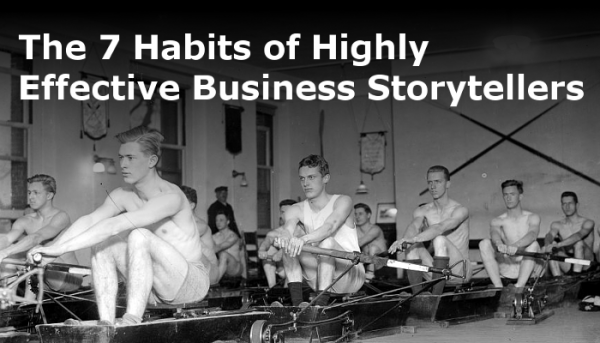
I first read Stephen Covey’s The Seven Habits of Highly Effective People in 1990. The lessons contained within have served my career well. But, after revisiting the book a few months ago, I noticed how applicable the habits were for business storytellers. Let’s take a look:
#1: Be Proactive
The best storytellers are intensely curious. They view the world in terms of roles, events, and influences. Guided by the mantra: “A story is the result of people pursuing what they want,” storytellers build their works around people’s motivations as opposed to their actions.
#2: Begin with the End in Mind
While most stories are told from beginning to end, they’re written the other way around. Master storytellers always know their story’s ending before they tell it. (StoryHow™ PitchDeck Card #17: Ending)
#3: Put First Things First
Business storytellers edit ruthlessly. They prioritize and weave details intentionally into their stories. If a particular point doesn’t advance the story, it is cut brutally and without remorse.
#4: Think Win-Win
Business storytellers always deliver something of value (audience win) while supporting the reason why they’re telling their story (storyteller win). They do so by aligning what the message means to the audience (StoryHow™ PitchDeck Card #47: Meaning) with the reason the story was chosen to be told (StoryHow™ PitchDeck Card #46 Purpose).
#5: Seek First to Understand, Then to be Understood
Business storytellers know where their audiences are coming from before they try to lead them someplace else. They build bridges to deeper levels of understanding through common interests, experiences, and philosophies.
#6: Synergize
Knowing that a burden shared is a burden halved, business storytellers seek the help of others for advice, knowledge, or to just borrow as sounding-boards.
#7 Sharpen the Saw
There’s always room for improvement. The best business storytellers read the works of other storytellers like Cole Nussbaumer Knaflic and Kendall Haven. They listen to podcasts such as The Business of Story. They go to the movies, watch documentaries and study other speakers. It’s like the old joke, “How do you get to Carnegie Hall? Practice, Practice, Practice.”
What are your habits?
Photo Credit: Library of Congress